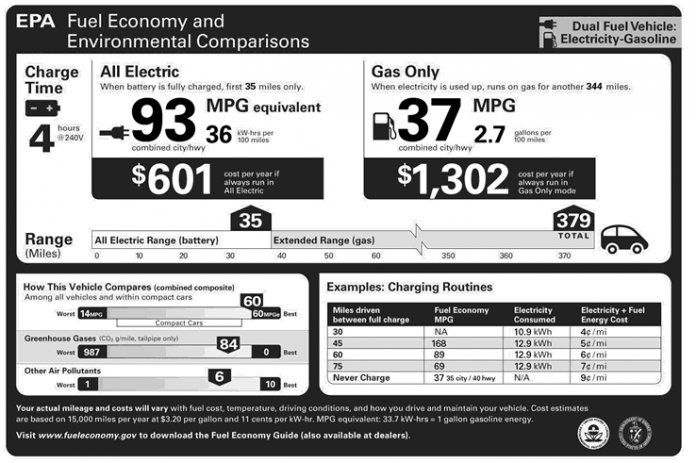The Attorneys General (AG) of 11 states have filed a petition in federal court requesting a review of new emissions rules from the National Highway Traffic Safety Administration (NHTSA) to determine whether they are lawful.
Led by Texas AG Ken Paxton, the AGs of Arkansas, Indiana, Kentucky, Louisiana, Mississippi, Montana, Nebraska, Ohio, South Carolina, and Utah, have filed a lawsuit against the NHTSA, Administrator Steven Cliff, the U.S. Department of Transportation, and Transportation Secretary Pete Buttigieg.
The AGs are seeking to have the court block the new standards and require the NHTSA to reconsider automakers’ ability to meet the standards and timelines while still producing affordable vehicles.
Biden Hikes Standards
The NHTSA has established Corporate Average Fuel Economy standards (CAFE) for new vehicles through 2026 in order to comply with President Joe Biden’s Executive Order “Protecting Public Health and the Environment and Restoring Science To Tackle the Climate Crisis.”
Biden instructed the NHTSA to revisit the Trump Administration’s ‘‘Safer Affordable Fuel Efficient (SAFE) Vehicles Rule for Model Years 2021–2026 Passenger Cars and Light Trucks,” and restructure the rules in accordance with the Biden administration’s environmental priorities.
After its mandated review, the NHTSA set new standards which it says “are consistent with the policy direction in the order, to among other things, listen to the science, improve public health and protect our environment, and to prioritize both environmental justice and the creation of the well-paying union jobs necessary to deliver on these goals.”
States Challenge CAFE Rules
The NHTSA’s new standards require significantly higher fuel economy increases to reduce emissions faster than the Trump-era rules—or those of any previous administration.
They mandate automakers increase fleet-wide fuel economy by 8 percent per year until 2025 and 10 percent for 2026 model year vehicles. This requirement is almost triple the historic fuel efficiency improvements of about 3 percent per year required under previous rules.
The states are asking the federal court to review the updated final rules to determine if they comply with federal law.
“Petitioner … States … hereby petition this Court for review of the final action taken by Respondents National Highway Traffic Safety Administration entitled “Corporate Average Fuel Economy Standards for Model Years 2024–2026 Passenger Cars and Light Trucks,” says the state AGs’ brief.
EV Mandate by Default
The new rules effectively mandate automakers only produce electric vehicles, because cars and trucks powered by internal combustion engines cannot meet the new standards on the timeline required, says Paxton’s office, in a press release announcing the states’ legal action.
“The regulation seeks to impose substantial increases in the number of electric vehicles on roads nationwide, with ramifications that will be felt throughout the automobile industry and our flailing economy generally,” states Paxton’s press release. “This challenge opposes the Biden Administration’s climate change agenda, contending that in promulgating the regulation NHTSA violated the express statutory prohibition on its mandating electric vehicles in setting the CAFE standards. The rule also implicates important state sovereignty interests.”
The states filed the petition to enforce the law and defend consumers interests, said Paxton in the press release.
“At a time when Americans are already struggling because of Biden’s inept policies and radical progressive agenda, NHTSA’s fuel standards will only create more concerns and saddle consumers with higher-priced electric vehicles,” Paxton said. “I will continue to fight back and challenge these unnecessary regulations that are unconstitutional and do more harm than good.”
Impossible Standards
The NHTSA has set standards that are virtually impossible for automobile manufacturers to meet, says Tim Benson, senior policy analyst at The Heartland Institute.
“Historically, the most manufacturers have been able to increase mpg year-over-year is about 3 percent, so surging average mpg by a whopping 10 percent is a tall order.” Benson said. “Adding insult to injury, the EPA has separately set carbon dioxide emission limits on automobile fleets.”
No automobile powered by an internal combustion engine sold in the Untied States currently meets the EPA’s exhaust emissions goal, says Benson.
“By 2026, cars will have to produce an average of 132 grams of CO2 per mile (g/mile) and light trucks an average of 187 g/mile for a fleet average of 161 g/mile, a 28 percent decrease from 2022,” said Benson. “If vehicles do not meet this standard, EPA will not certify them for sale, yet no gasoline-powered car currently emits CO2 at this extremely low level.”
Boosts All Vehicle Prices
Because the emissions standards cannot be met by any gasoline or hybrid vehicle presently on the market, new technology must be developed.
But research and development of low-emissions cars, including electric vehicles (EVs), is expensive and time-consuming, says Benson, meaning car manufacturers will have to increase the price of new vehicles across the board.
“Meeting these new NHTSA and EPA standards so quickly will require manufacturers to dramatically increase expenditures on research and development, which will increase the price of new gasoline-powered vehicles and force manufacturers to build an extensive portfolio of EV models.” Benson said.
“Additionally, the demand for the materials needed for battery construction, which are already in short supply, will naturally rise alongside these agencies’ demands for more electric vehicles. Since the battery cost will rise, the price of electric vehicles will increase sharply right along with the price of gasoline powered cars.”
Huge price increases are on the way, says Benson.
“Ford recently announced that due to rising material costs, their Mach E EV will be $25,000 more expensive to manufacture than the equivalent gasoline-powered Edge, indicating Biden’s policies are serving to further widen the gap between average American’s and the wealthy elite his climate mandates cater too—so much for ‘making life more affordable’ for American families,” said Benson.
Linnea Lueken (llueken@heartland.org) is a research fellow with the Arthur B. Robinson Center on Climate and Environmental Policy at The Heartland Institute.
For more on CAFE standards, click here and here.


























